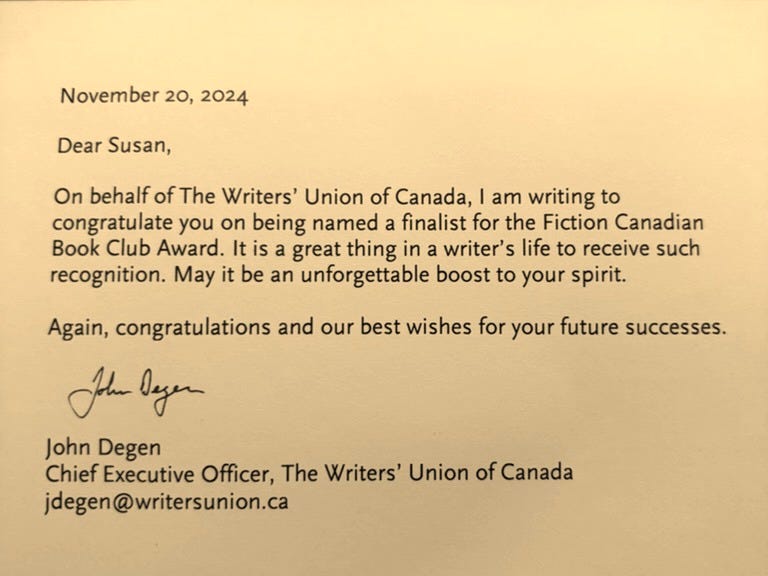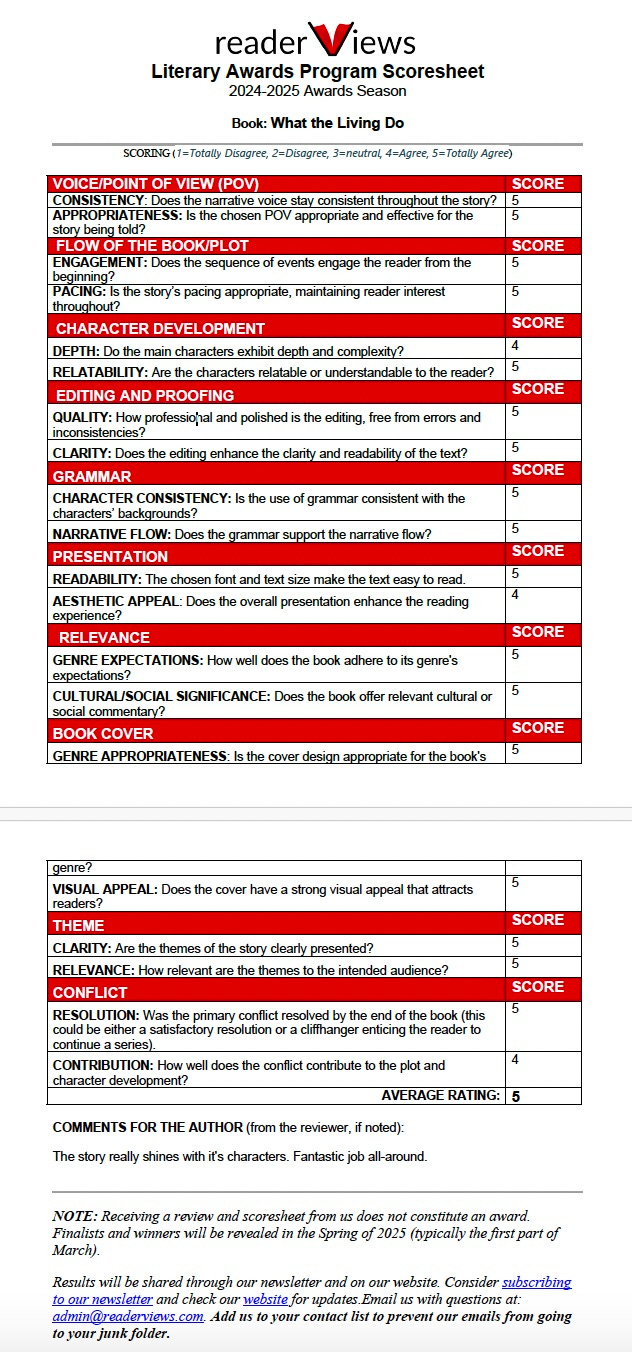Happy Solstice. May there be light and delight in your life.

In this newsletter:
I remind you of the marvellous puzzle you could win.
A gracious letter from The Writers Union of Canada’s Chief Executive Officer.
A little about the Amherst Writers & Artists Write Around the World initiative
A short essay about what we don’t want to see or know,
PUZZLE
I’ll draw a name to win the Canadian Authors’ Association puzzle at 1 pm on January 1 live on YouTube. View it here. If you’d like a chance to win either a 500 or 1000-piece puzzle, just send me a pic with you and a copy of What the Living Do, digital or hard copy. Many libraries have it—Chapters, or best of all, from your local bookseller.
THE WRITERS UNION OF CANADA
In September I received the news that my novel was a finalist in the Canadian Book Club Awards fiction category, which was beyond thrilling. The winner will be announced in January. What I never expected was the following letter - in the actual mail! - from John Degen acknowledging it. I was so moved there were actual tears. Not out and out sobbing, but real tears. I mean, wow, how incredibly gracious.
A 5-STAR REVIEW
Right on the heels of this generous note, I received a glowing review you can read here from Reader Views Book Reviews.
I include the rundown of the way it was scored because it could be helpful for writers when considering the effectiveness of a novel’s various aspects.
WRITE AROUND THE WORLD
This February, writers worldwide gather to write in the AWA Method.
AWA-certified facilitators help raise funds by offering donation-based writing groups. Proceeds from each session support AWA and its mission. New writers can experience the AWA Method and celebrate each other’s unique voices.
The calendar of Write Around the World (WAW) events will be live soon, please check back here in January or sign up for the AWA mailing list here.
Payment Options
Most groups meet online between February 1st and 28th, with a sliding scale from $20-40. A few affinity groups, with registration open to members of a specific community—for example, teens or LGBTQ+ people—will also be on the calendar.
To help you take advantage of our packed schedule of writing sessions, we have a bulk discount: $15 each if you purchase 5, or $14 each for a batch of 10.
If cost is a barrier, please ask about a discount or waiving your donation.
I’m offering four open-prompt workshops during the event.
Continuing to write about what I didn’t want to write about anymore
The following piece is about the same stuff addressed in the novel that just got rejected by my dream agent. She said that in the current climate, people don’t want to read about this depressing subject (but also admitted that dystopian stuff continues to be gobbled up). I get it. No one wants to know, or even think, about people doing bad things to children, but guess what?
It’s okay, you don’t have to guess—you know.
I view myself as relatively intelligent, and relatively perceptive. What needs to be understood, in my view, is that intelligent people sometimes choose to defend or dismiss bad, read unconscionable, behaviour, out of love, conditioning, loyalty, fear, or that old favourite—gaslighting.
There’s this thing about hindsight, right? But hindsight is generally revealed once the trauma has passed, often long past. Hence, the term hindsight.

I, for one, would like us all to wake up and wash away whatever film lies over our eyes, ie: make it stop. The only method I have to join forces with those who feel the same way is to write about it. Don’t get me wrong—I don’t like writing about these things. And I keep believing that I’m done; that the ink on that particular pen has run out, or to use a different metaphor, I ran the faucet long enough for the water to clear.
Unfortunately, not yet.

Prompted by Marissa Glover’s stunning poem: Talk is cheap but it still packs a punch, I wrote the following:
I can show you the tree, the room, the car, the closet. Or the spot by the river where the girl was on her knees. The woman might have been curled in her own bed, her child tucked in warm, tucked in safe. Or she might have been in the office, on a plane, selecting produce at the market, emptying the dishwasher, or folding a sheet.
It’s grown over now, but even replanted berries and greens hoping to create nourishment haven’t thrived. Moss sidled up the riverbank, drying the berries, shrivelling the green sprouts.
I can show you where it happened. The girl. The child. The hungry man with the kind face. I can point to it, that place, that spot, but even if you wanted to, and likely you don’t, you might simply offer gardening advice. There’s nothing to show, is what I’m trying to tell you. Trying to say.
Moss, soft as a cheek, has concealed what lies beneath. They once lined cradleboards with this kind of moss. To protect the child. To keep the child safe.








Susan, what an incredible review!